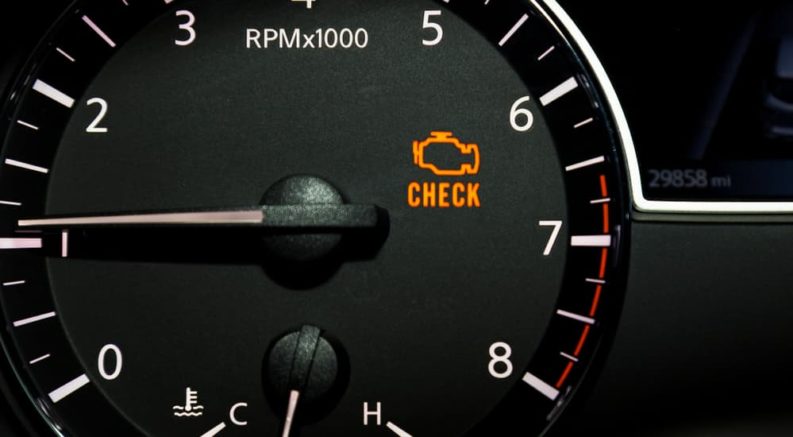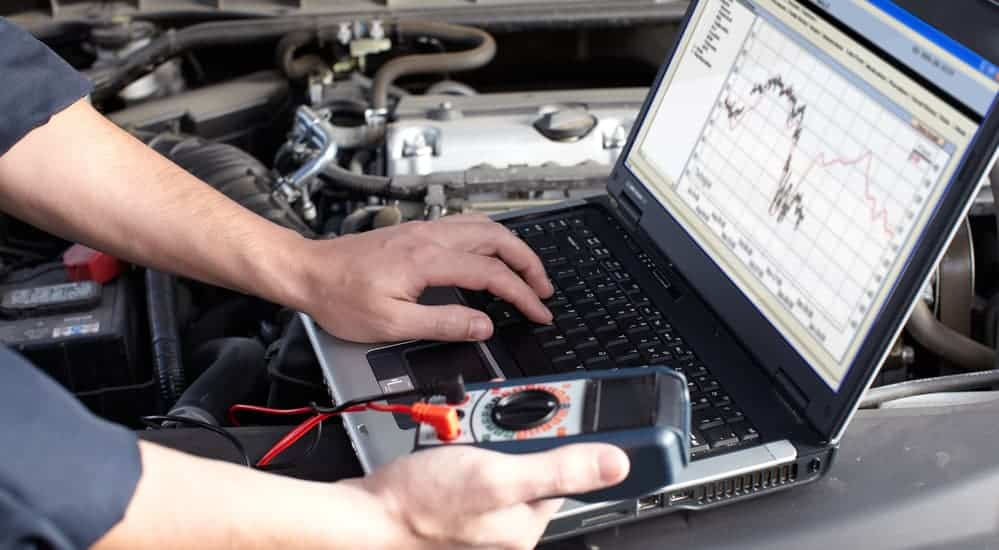Seeing your check engine light come on can be scary – after all, an emergency light must mean there is an emergency. Sometimes these lights can definitely mean there is a serious problem, while other times, your Ford check engine lights can be caused by something pretty minor that you can easily handle yourself. Knowing how to respond when your check engine light comes on is just as important as paying attention to it in the first place and is a part of good vehicle care and general maintenance.
Know How to Respond
First things first: don’t ignore your check engine light if it comes on. That thing is not just there to look pretty or remind you that you need new windshield wipers – it is a warning that something is wrong with your engine. Even if it’s something minor (and hopefully it is), that can turn into a much bigger problem if you just ignore it and hope it will go away on its own. So, no matter what else you do, be sure to act promptly and take care of the problem sooner rather than later.
Second, when you see your check engine light illuminate, try to be more aware of how your vehicle is handling. Feel for any unusual or new vibrations while driving down familiar roads. Turn off your music and listen to your vehicle and the engine to see if it sounds like it is struggling or misfiring in any way. You might not notice anything, but any other signs of a problem that accompany your Ford check engine lights coming on can help you or a mechanic diagnose the issue.
What Does Your Check Engine Light Mean?
In general, when your Ford check engine light comes on, it means that something has gone wrong with your engine. Specifically, it indicates that the On-Board Diagnostic System (OBD-II) has detected that something is wrong with your engine – that will matter later, so remember that.
When you first start your Ford vehicle, you will see the check engine light come on when you turn on the ignition, but it will turn off once you actually start your engine. That is completely normal, and it’s just there to let you know when your ignition is on but not your engine. So if you have a new vehicle and you notice that your Ford check engine lights come on every time you start it, don’t be worried.

If the lights do not turn off once your engine is on, however, then that’s a problem. Also, if you notice your Ford check engine light comes on while you are driving, then that also means there is some kind of issue. Fortunately, there are some simple things you can do to see if the cause of the problem is minor and easily solved.
Simple Solutions
One of the most common causes of your Ford check engine light coming on, and staying on, is that there is an issue with the seal on your gas tank. This throws off the pressure in your gas tank, which messes with your vehicle’s entire drive system and not only hurts your fuel efficiency but also activates your check engine light. So, the first thing you should do when you see the light come on and stay on is check your vehicle’s gas cap.
Obviously, if you are driving and it comes on, you can get to a safe place to pull over and stop. Don’t cause a collision by panicking at the first sight of your check engine light.
Once you can safely stop, or even get home if you are not far when you see the light come on. Check your vehicle’s gas cap. Take it off and place it back on, making sure you secure it tightly and thread it properly when you affix it. It’s entirely possible that you had mis-threaded the gas cap or that it was loose and caused the light to come on. If you cannot get a secure and tight fit, or if your gas cap is visibly broken, then replace it with one that makes a tight seal.
If this does not fix the problem, then check your engine’s oil level. While you probably have a light specifically for low oil in your vehicle, an issue with your oil level can potentially trigger your Ford check engine light. If you are low on oil, then add some to get it back up to where it should be. If this is a reoccurring issue, then you might have an oil leak that you need to fix.
Diagnostic Methods
If you want to take your car repair game up a level, you can buy an OBD-II Scanner; they are typically not all that expensive. This is a handheld device that you connect to a diagnostic port on your vehicle, which you can typically find under the dashboard. Once you do this, the scanner will interface with your car’s computer and give you a diagnostic code for what’s wrong.
This will give you a direct look at what is causing your Ford check engine light to come on. You will see a code on the scanner that tells you what has activated the light. It might be something simple like changing a spark plug. Or, it could be something a bit more serious.
More Complex Solutions
Unfortunately, there are much more serious issues that can cause your Ford check engine light to come on, and they need more elaborate solutions. You might have a malfunction with your catalytic converter, your mass airflow sensor, or your oxygen sensor. These are all parts of your engine that are involved in the proper function of your vehicle.
Fixing these issues can be pretty simple, like replacing a sensor or even checking for a loose wire or computer issue. If you have an OBD-II Scanner, then you can look at the code displayed by your car’s computer and try an appropriate solution. Without a scanner, you will need to take your vehicle to a shop to have them run a diagnostic and see what’s wrong. As long as you have a service center or auto shop that you trust, they should be able to figure out the problem pretty quickly, and with any luck, the solution won’t be too expensive.
Flashing Check Engine Light
One thing of note before we wrap this up, however, is an exception to everything else I’ve said so far about your Ford check engine light. If the light does not come on and stay on, but instead begins flashing or blinking on and off, then that is an indicator of a serious problem. If your check engine light is flashing, it means that your engine has misfired in some way, and your car’s computer is basically freaking out about it and letting you know.
This might mean you have a messed up spark plug or that a much more serious problem in your engine has occurred. Continued use of your vehicle can cause serious damage to your engine, especially if you have a cylinder that is not working properly. If your Ford check engine light starts blinking at you, safely get your vehicle over to the side of the road or into a parking lot as soon as possible and turn it off.
It’s time to call a friend for a ride or find a number for a tow truck. Don’t drive your vehicle, but have it taken to a shop immediately for service. It might be a pretty minor warning right now, but continued use could cause expensive damage to your engine.


